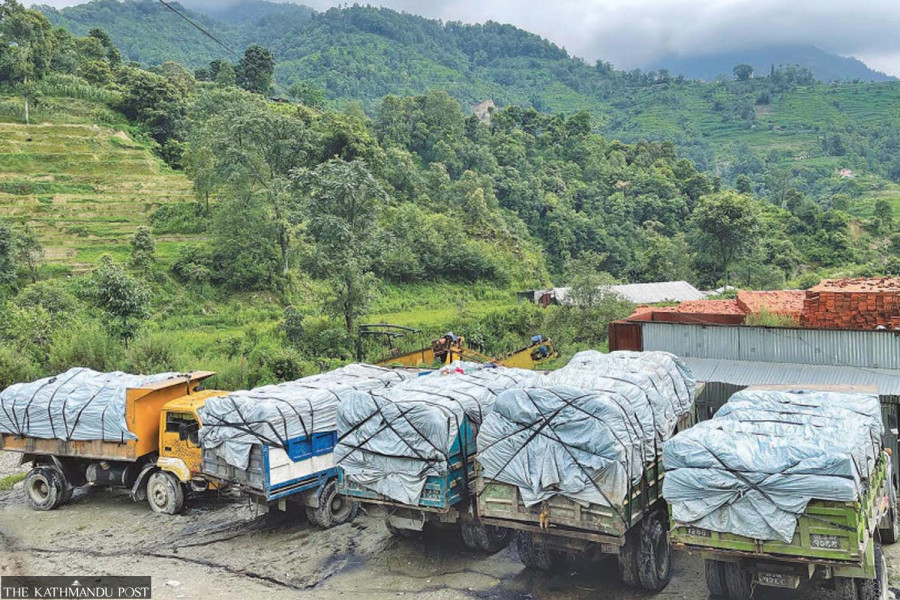Valley
After government’s ‘preliminary draft’ for solution, landfill victims defer their protest until Oct 7
Negligence at the landfill site has caused reduction in agricultural production, proliferation of flies, disruption of education in schools, respiratory problems and skin diseases.
Anup Ojha
After assurance from Office of the Prime Minister and Council of Ministers for solving the garbage problem in Banchare Danda through the formation of a separate, independent entity, the Banchare Danda Landfill Affected Area Concern Committee and local residents have postponed their strike of obstructing garbage disposal till October 7.
The Prime Minister’s office on September 12 had sent a letter requesting the committee to postpone its protest. The letter states that it has already consulted the concerned stakeholders like the Ministry of Urban Development and the Kathmandu Metropolitan City (KMC) regarding the issue and that it has directed them to address locals’ problem.
In his conversation with the Post, Maniram Gelel, secretary at the Office of Prime Minister and Council of Ministers, said Prime Minister Pushpa Kamal Dahal has shown concern to solve the garbage problem in Banchare Danda and the problem people in the area have been facing.
“We are positive about forming a separate entity to solve the perennial garbage problem, if all the 18 local bodies in Kathmandu Valley agree,” said Gelel.
He said as Local Government Operation Act 2017 and Solid Waste Management Act 2011 have given full authority to local bodies to manage the garbage generated from their areas. He further said that the federal government should now take permission from the local bodies to manage the present garbage problem in the Valley.
“Even Prime Minister Dahal has taken this issue very seriously because the locals in landfill site have been living difficult lives for 18 years due to the unmanaged solid waste,” Gelel said.
Meanwhile, the prime minister on Saturday left for New York to attend the 78th edition of the United Nations General Assembly.
Representatives of the struggle committee and locals, however, said that if their demands are not met this time, no one can stop them from obstructing garbage disposal at Banchare Danda.
“We have postponed our protest plan after we got a letter from the Prime Minister's office, but if our demands are not met, we will start our protest from October 8,” said Shree Ram Dhungana, coordinator of the committee.
On August 28, the committee and local residents at a press meet said they would obstruct garbage disposal at the Banchare Danda landfill site from September 18 if their concerns weren’t heeded to.
The committee had organised the press meet after sending memos to more than two dozen stakeholders, including the Prime Minister's Office, Ministry of Urban Development and the KMC. Prior to it, the committee members had also reached out to all concerned government agencies seeking a resolution to their problems without delay.
After the locals’ month-long protest plan, officials at the Urban Ministry sent a zero draft (preliminary draft) to the Prime Minister’s office, urging it to solve the garbage problem in Banchare Danda.
“Once the Prime Minister returns, it will get a new shape, but the local bodies should agree on the issue to make an integrated plan,” said Gelel.
Besides seeking relocation of residents in Banchare Danda, the committee has also asked government authorities to form a separate independent authority to handle the garbage generated from Kathmandu Valley. Officials at the ministry say that a total of 3,000 ropanis of land is needed if the entire settlement is to be relocated.
Among the key demands of the committee are: to relocate the settlement in the most affected zone, to conduct environmental impact assessment (EIA) and make the area a smell free zone, and to find a scientific solution to prevent the leachate from mixing into the local Kopu Khola river are kept in priority lists.
Reduced agricultural yields, diseased animals, proliferation of flies, disruption of education at school due to the stench from rotting waste, respiratory problems and skin diseases are some of the most common problems the residents in the area have been living with for nearly two decades.
“We don’t trust the Kathmandu Metropolitan City and other local bodies. The problem is beyond their capacity to handle,” said Dhanguna.
KMC’s Mayor Balendra Shah had previously said that managing the garbage problem of Kathmandu and solving the problem of locals in Sisdole was his first priority. However, his administration could not do anything substantial to solve the perennial problem that has existed since 2005.
In recent times, officials at the KMC have said that they alone can't meet the demands of locals in the landfill site.
In the past 18 years, government authorities have inked 175 agreements with locals but none of them have been implemented. In June last year, following a protest by locals, the KMC and the representatives of Sisdole and Banchare Danda residents had reached an 18-point agreement. Before the deal, there had been a three-way agreement with the involvement of the Ministry of Urban Development.
Gelel, the secretary at the office of the Prime Minister, said if the local bodies give money and equipment to form a separate entity to solve the garbage problem, it could be a way out.
“We are in consultation with the mayors of local bodies. This issue has to be solved at any cost,” Gelel added.
Nabin Man Manandhar, spokesperson at the KMC, said they are positive about solving the problem. “The issue will be discussed in the Kathmandu Valley Mayor Forum,” he said.
Kathmandu Valley generates 1,200 tonnes of solid waste a day. Nearly 60 percent of it is produced within the Kathmandu Metropolitan City. Experts say more than 60 percent of the organic waste originating in the Valley can be converted into compost manure.




 22.28°C Kathmandu
22.28°C Kathmandu.jpg)














